Frozen Deltas
July 30th, 2025

This summer, I began a series of new pilot experiments in the flume lab. Ever since I learned about the Late Noachian Icy Highlands (LNIH) hypothesis for early Mars, I’ve been curious about how ice might have influenced Martian delta environments. On Earth, we know that Arctic deltas undergo strong seasonal changes that shape their morphology, yet even the detailed processes behind these changes are still being studied. To help advance this field, we developed a new approach to study ice-dominated deltas.
Throughout my academic career, I have focused on physical experiments. I recently completed my own delta experiments in the Metronome flume, and in our building, we have a massive freezer for storing sediment cores. These elements came together to spark a new idea: Frozen Deltas. Our goal is simple but exciting—we’re going to run a delta experiment inside the freezer.

I started this project with my friend and colleague, Jana Cox. We both study deltas, but from different perspectives: my research focuses on natural processes, while hers examines how deltas adapt to ongoing challenges such as flooding, sea-level rise, and sediment starvation. We realised that this project could benefit both my Mars-related research and our understanding of Arctic deltas, which are currently facing rapid environmental change. These regions are experiencing thawing permafrost that destabilises the subsurface, releases methane, and opens new opportunities for gas and oil extraction, shipping routes, and even strategic military bases.
Together, we supervised a master’s student who conducted several pilot studies. The experiments in which the sediment bed was periodically frozen yielded very promising results. However, the pilot that attempted to simulate sea ice was less successful, mainly because the materials used could not withstand the expansion that occurs when water freezes. Though the frozen bed experiments were so successful that we will continue these experiments in the future.
